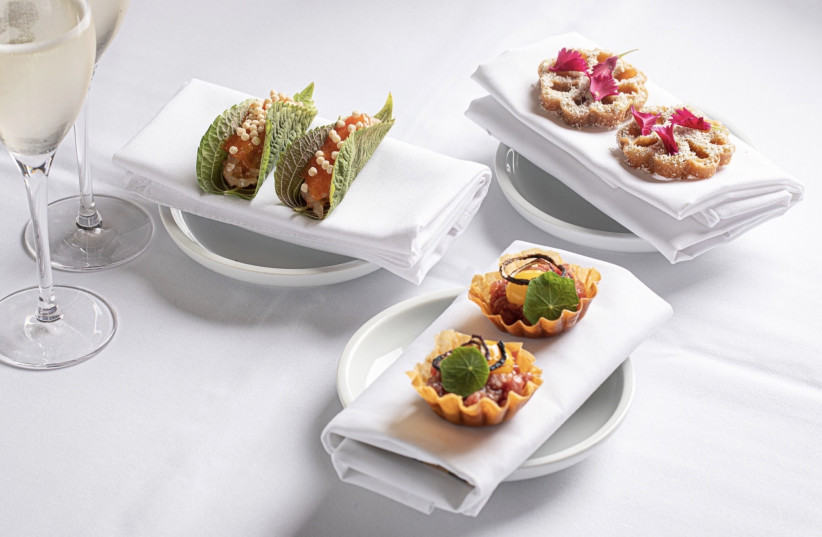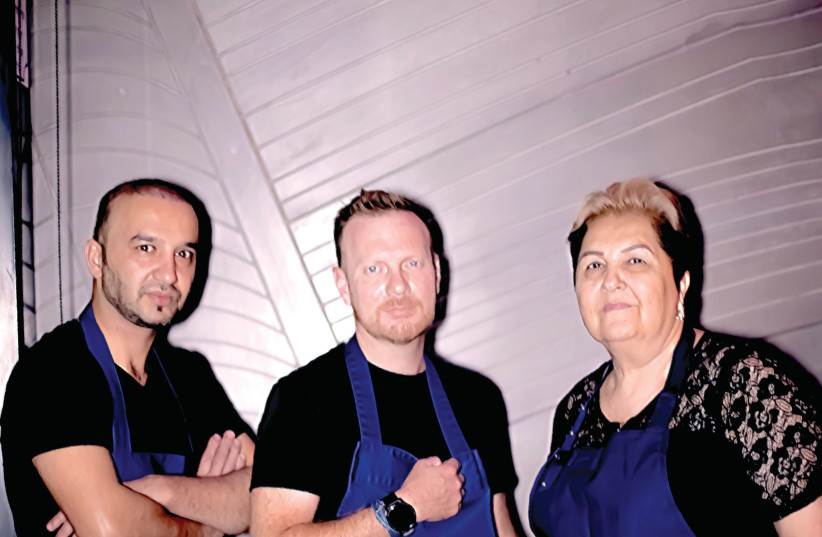Come hungry and come excited, the second Israeli Cuisine Festival and Awards are here, set to dish out a full serving in the rich, diverse and evolving culinary tradition of the Holy Land.
The festival, sponsored by American Express, will run from November 20 to 30. It is slated to feature dozens of original culinary events for an audience of around 3,000 foodies, to showcase the diverse and ever-changing cuisine in Israel. After that, on December 12, the festival will hold the Israel Cuisine Awards to acknowledge the standout talents, figures and organizations in the Israeli culinary scene.
The festival was the brainchild of its three leaders: Israeli culinary entrepreneurs David Kichka, Nirit Weiss and Gretel Scheiner.
But where did the idea come from?

Israel: Start-Up Nation or Starter Nation?
“We live here, we are all Israeli, and we love Israeli cuisine and the culinary scene,” Kichka told the Magazine.
However, another factor that played a role was the pandemic. With borders closed and more people stuck at home, greater appreciation was placed on not only Israel’s food but also its ingredients and agriculture.
“COVID-19 did something special to help us be proud of local ingredients, agriculture, artisanal producers and chefs,” Kichka explained, noting that the first Israeli Culinary Festival and Awards took place between lockdown periods in the pandemic. “We wanted to encourage them. We want to help restaurants, the small chefs, during COVID.”
This explains the local feel of the festival, with an extreme focus on not only Israeli food but also food made in Israel. After all, as Kichka put it, food is something Israel can take pride in.
“Many culinary festivals are more international and eclectic, but we really wanted to celebrate Israeli cuisine. It’s part of our culture and it’s very unique,” he said.
“We saw people really liked it the first time, and we’re excited to speak about it outside of Israel. It’s something we can be proud of, like hi-tech. It’s better to be known for this than our politics.”
David Kichka
“We saw people really liked it the first time, and we’re excited to speak about it outside of Israel. It’s something we can be proud of, like hi-tech,” he laughed, adding “It’s better to be known for this than our politics.”
And he isn’t joking. Kichka explained that understanding people’s food is a window into understanding their culture.
“When I travel, I always try to understand the local culture through food,” Kichka said. “It doesn’t matter if it’s trying street food, a Michelin-star restaurant, whatever. It doesn’t matter.
“This is why we have food talks, meetings with chefs and food bloggers – and, of course, dinner at special restaurants; old, traditional, iconic restaurants that are going to hold special meals with Israel’s young and talented chefs. These chefs are our future because they are going to be the ones designing the new Israeli cuisine.”
What is Israeli cuisine?
So what exactly is Israeli cuisine? What does Israel’s food say about Israeli culture? Those are other questions the festival seeks to answer.
To put it simply, Israel’s cuisine is a diverse and ever-evolving blend, just like Israel itself. A country of immigrants from all over the world in a land steeped in history, linked to and influenced by its neighbors, heritage and immigrants alike, a melting pot in all aspects.
This diversity in, and dialogue between, origin, method and age are part of the main theme of this year’s festival.
But for Kichka, the root of Israeli cuisine can be derived from four factors: immigration and globalization, Mediterranean location, Jewish tradition and Israeli chutzpah.
Israel, he said, is an immigrant country, and each immigrant group brings their own culinary traditions with them, either just the Jewish cuisine or the food of their country of origin.
“Israel is this big melting pot, and this quality is also in our dishes.”
David Kichka
“Israel is this big melting pot, and this quality is also in our dishes,” he said.
Jewish tradition also plays a big role in how Israeli cuisine has developed.
Part of this is due to kashrut, Judaism’s dietary restrictions, which has heavily influenced what Jews have eaten throughout history. But other traditional aspects play an equally important role, especially traditions like Shabbat, which is usually marked by large meals with close family, accompanied by traditional dishes such as challah, cholent or jahnun.
“Sure, you can get a cheeseburger in Tel Aviv, but kashrut and Shabbat dishes still heavily influence us, whether cholent or jahnun and other Shabbat dishes, and everyone eats challa now anyway,” Kichka said.
He noted that the diverse Diaspora has also led to a number of different Jewish Shabbat dishes from around the world, all of which come together here in Israel.
Israel also benefits from its location, and thus shares similarities with other nearby countries in the Eastern Mediterranean. This is true both in culinary tradition and in available ingredients.
“We’re on the Mediterranean, so we can’t forget ingredients like olive oil and fresh vegetables, the same as Cyprus, Greece, Turkey and Lebanon,” Kichka said. “We’re also influenced by our neighbors, the Arabs and Palestinians.”
And this culinary exchange with the broader world doesn’t stop with immigrants and Israel’s regional neighbors. Many young Israeli chefs go abroad and study cooking around the world. They then bring back with them what they learned abroad and incorporate it into their own cooking.
“I know a chef who’s half-Persian and half-Egyptian, but he likes making Italian food,” Kichka pointed out. “We can allow ourselves to be less restrictive.”
This ability to be less restrictive is the fourth pillar of Israeli cuisine: chutzpah.
To explain, compare Israel to France, where, as Kichka pointed out, there are books and traditions dating back hundreds of years explaining exactly how to make something. And these rules can be very ingrained and difficult to break.
But chutzpah is all about breaking the rules, and it is something Israel specializes in. This, Kichka explained, helps Israel’s chefs innovate and experiment, evolving and developing their cuisine without rigid rules, in order to try new things and make new culinary delights.

Dialogue about Israeli cuisine: Jewish and Arab, old and new, tradition and innovation
As part of the goal of showing the dialogue between the multifaceted aspects of Israeli cuisine, the Israeli Cuisine Festival will hold a number of events featuring unique fusion meals. This is where talented younger chefs in Israel will come to iconic restaurants to make meals blending their unique style with that of the restaurant.
For example, at the renowned Tel Aviv Bukharan restaurant Hanan Margilan, a meal will be prepared with Yuval Ben Neriah of the pan-Asian restaurant Taizu, blending both styles together.
Another exciting meal, and this one is kosher, will take place in Jerusalem. It will feature the chefs of Majda, a kosher restaurant owned by a Jewish and Arab husband and wife duo, located in the Ein Rafa village outside Abu Ghosh. They will be plying their trade in the heart of the capital, specifically at the 02 kosher meat restaurant at the Inbal Hotel, run by head chef Nimrod Norman.
A third event will be a pop-up restaurant at the Animar bistro and tavern in Tel Aviv, featuring Yizhar Sahar and Hila Ronen-Sahar of the Rutenberg restaurant near the Jordanian border, the winners of last year’s Israeli Cuisine Award for Outstanding Restaurant.
Here, the two will bring ingredients with them, combining their knowledge of local produce and wine to serve a wonderful eight-course meal, with the help of the Recanati Winery winemakers.
Rutenberg specializes in local produce from the Golan and from his own private garden. This will be combined with the meal’s host, Animar, whose head chef, the renowned Hillel Tavakuli, specializes in Mediterranean cuisine with heavy influence from Turkish, Iraqi and Persian culinary traditions.
All of these and the many other events of this nature highlight the diversity of the cuisine, and the match-ups are no accident.
“We try to do very unique groups for a very unique experience for those who come,” Kichka said.
But there will be more to this festival than just these unique dining experiences. There will also be tours to get the full scope of Israel’s agriculture and ingredients which have been the building blocks for Israeli cuisine.
These foraging and culinary tours will take guests on a journey from the Judean Mountains to cities like Nazareth and Acre, getting the full range of Israeli cuisine, both Jewish and Arab, new and old, traditional and innovative.
Have more questions about what exactly is Israeli cuisine? Well, if eating the food isn’t enough, there are also plenty of talks, workshops and panels with some of the leading figures in the Israeli culinary world. This includes talented chefs, restaurateurs, food bloggers and writers and more.
And that all leads to what will happen on December 12: the awards.
Done in the style of the James Beard Awards in the US, the Israeli Cuisine Awards recognize the figures in the Israeli culinary landscape that have greatly contributed to the development of the local cuisine.
However, it won’t just be chefs that are recognized and awarded for their accomplishments. Awards will also be given to food bloggers and writers, to artisanal producers, to figures in the agricultural sector. In 2021, one of the awards was given to the Tzohar Rabbinical Organization for its work on kosher certification of various restaurants across Israel, so it is possible that an award for the kashrut sector may be in the cards as well.
However, these awards aren’t meant to simply be participation medals for passive actors. Rather, they serve a greater purpose: to help foster the growth of Israel’s culinary scene.
“It’s important to build our own culinary culture,” Kichka explained.
The way to do that is by encouraging and validating the efforts of all the important figures and players in Israeli cuisine.
But don’t worry if you can’t make it to this year’s festival because, unlike last time, you won’t have to wait another year for more.
“Last year, because of COVID-19, we couldn’t do more than the festival and awards,” Kichka said. “This year, though, we can.”
Kichka explained that he plans to have a special spring edition around May. It won’t be the same, meaning no awards, but it will still be a special event to showcase Israeli cuisine.
Kichka also hopes to take this show on the road and hold events internationally. However, he still hopes to bring others back here for more annual events like this one.
So come on down and come hungry to the Israeli Cuisine Festival and Awards – and make sure to have room for seconds. ■
The Israeli Cuisine Festival will be held November 20-30. The Israel Cuisine Awards will be held on December 12 at the Lighthouse Hotel by Brown in Tel Aviv.
Prices for each event range from NIS 228 to NIS 468. American Express customers get a special discount 48 hours in advance and an exclusive package of tours, meals and workshops for NIS 150.
A special accommodations package, including a stay at a Brown hotel in Tel Aviv, is available for NIS 1,333.
For more information on prices, events and ordering tickets, visit the festival’s website at israelicuisine.co.il
